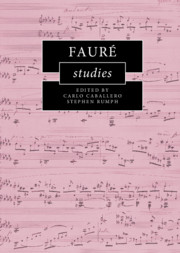Book contents
- Fauré Studies
- Cambridge Composer Studies
- Fauré Studies
- Copyright page
- Dedication
- Contents
- Figures
- Tables
- Music Examples
- Contributors
- Acknowledgments
- Looking Back on a Journey
- 1 Patrons and Society
- 2 Keys to the Ineffable in Fauré
- 3 Fauré as Student and Teacher of Harmony
- 4 Romancing the mélodie, or Generic Play in the Early Hugo Settings
- 5 Lux aeterna
- 6 From Homer’s Banquet to Fauchois’ Feast
- 7 Orchestral Melody in Pénélope
- 8 Fauré the Practical Interpreter
- 9 Fauré, Orientalism, and Le voile du bonheur
- 10 Jankélévitch, Fauré, and the Thirteenth Nocturne
- Index
2 - Keys to the Ineffable in Fauré
Criticism, History, Aesthetics
Published online by Cambridge University Press: 17 April 2021
- Fauré Studies
- Cambridge Composer Studies
- Fauré Studies
- Copyright page
- Dedication
- Contents
- Figures
- Tables
- Music Examples
- Contributors
- Acknowledgments
- Looking Back on a Journey
- 1 Patrons and Society
- 2 Keys to the Ineffable in Fauré
- 3 Fauré as Student and Teacher of Harmony
- 4 Romancing the mélodie, or Generic Play in the Early Hugo Settings
- 5 Lux aeterna
- 6 From Homer’s Banquet to Fauchois’ Feast
- 7 Orchestral Melody in Pénélope
- 8 Fauré the Practical Interpreter
- 9 Fauré, Orientalism, and Le voile du bonheur
- 10 Jankélévitch, Fauré, and the Thirteenth Nocturne
- Index
Summary
Contrary to received wisdom, music has always been connected with language, however tenuously, on at least two levels. First, despite theoretically standing apart from our two principal systems of representation, words and images, music has persistently been linked throughout our history and culture with something beyond itself. Each age has constructed a system of relationships, metaphors, or analogies through which musical scores are conceived and heard – simple examples include a musical “phrase,” “high” and “low” pitches, “soft” and “powerful” tones.1 Second, music has constantly been connected with verbal discourse, whose importance increased throughout the nineteenth century (if only through the proliferation of the press and the growth of writing about music): musical works are not understood and appreciated as unmediated objects, but are filtered through discourses that precede, accompany, and succeed them. Aesthetic theories, critical reception, and historical studies, together with informal conversation, enter into the life of a musical work. It is this second level that will concern us.
Keywords
Information
- Type
- Chapter
- Information
- Fauré Studies , pp. 35 - 58Publisher: Cambridge University PressPrint publication year: 2021
